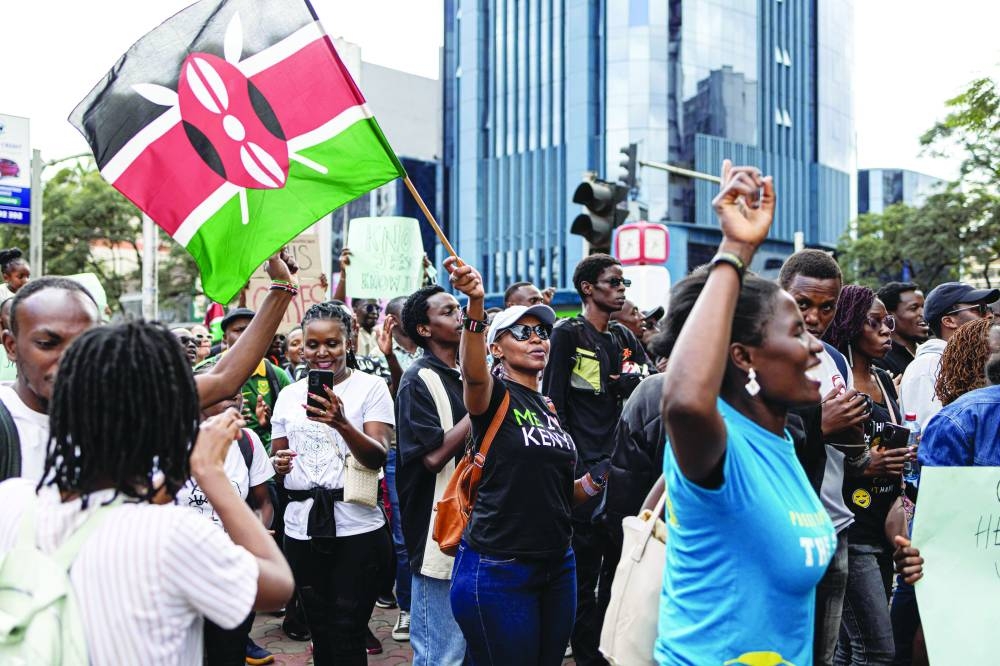Kenya’s President William Ruto said yesterday that he was ready for “a conversation” with thousands of “peaceful” young anti-tax protesters, prompting new calls from the movement’s organisers to accept their demand to cancel the levies.
Organised on social media and led largely by Gen-Z Kenyans who have livestreamed the demonstrations, the protests by thousands of people have caught Ruto’s government off guard, as discontent mounts over his economic policies.
“I am very proud of our young people...they have stepped forward peaceful and I want to tell them we are going to engage them,” Ruto said in his first public comments on the protests.
“We are going to have a conversation so that together we can build a greater nation,” Ruto said during a church service in the Rift Valley town of Nyahururu.
His characterisation of the protests as “peaceful” came after rights campaigners reported two deaths following Thursday’s demonstrations in Nairobi.
A protest organiser, Hanifa Adan, who told AFP that she was in hiding to avoid arrest, said Ruto needed to “respond publicly” to demands that the proposed hikes be cancelled.
“President Ruto can’t claim to support us while his police brutalise peaceful protesters,” she said.
“We’re past the talking stage and won’t be silenced. We demand an end to police violence, respect for our constitutional rights, and the freedom to speak up without fear of arrest or harm.” Amnesty International Kenya said yesterday that “in the last 72 hours, protest organisers, content creators, medics and protesters have been profiled, abducted and detained in violation of our laws”.
The rights watchdog did not elaborate on the number of detainees, and there was no immediate comment by the police.
Thursday’s demonstrations were mostly peaceful, but officers fired tear gas and water cannon throughout the day to disperse protesters near parliament.
A Kenya Human Rights Commission official told AFP on Saturday that 21-year-old Evans Kiratu was “hit by a tear gas canister” during the protests and died in hospital. On Friday, a police watchdog said it was investigating allegations that a 29-year-old man was shot by officers in Nairobi after the demonstrations. The Independent Policing Oversight Authority (IPOA) said it had “documented the death...allegedly as a result of police shooting” on Thursday. Several organisations, including Amnesty International Kenya, said that at least 200 people were injured in the protests in Nairobi, as thousands of people took to the streets across the country.
The protesters have called for a national strike tomorrow.
After smaller demonstrations in Nairobi last Tuesday, the cash-strapped government agreed to roll back several tax increases laid out in a new bill.
But Ruto’s administration still intends to raise some taxes, saying they are necessary for filling the state coffers and cutting reliance on external borrowing.
Kenya has a huge debt mountain whose servicing costs have ballooned because of a fall in the value of the local currency over the last two years, making interest payments on foreign-currency loans more expensive.
The tax hikes will pile further pressure on Kenyans struggling with cost of living surges, with well-paid jobs remaining out of reach for young people.
Ruto said yesterday that the annual budget included measures to tackle youth unemployment and improve access to higher education. After the government agreed to scrap levies on bread purchases, car ownership and financial and mobile services, the treasury warned of a budget shortfall of 200bn shillings ($1.56bn).

A woman waves a Kenyan flag while marching against the Finance Bill 2024 in downtown Nairobi, yesterday.
